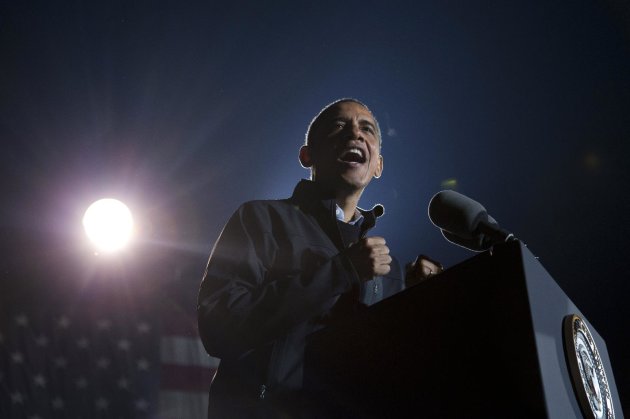Gaza Doesn’t Care About American Election
Four years ago, Palestinians were head over heels for the American president with African and Islamic roots, in hopes that he could affect the change that he promised voters. In the case of the Middle East in general and the Palestinian Territories in particular, they hoped he could touch the people of the region and enjoin this change in their everyday lives and their future.
Perhaps the Palestinians at this time expected to see American policy in support of the faltering peace process with Israel, or, in respect to other positions of this nature, for it to support Palestinian demands in the obtainment of the state for which it has waited so long. However, “None of that has been accomplished,” says Abu Khaled Mustahee, a fabric seller on Omar al-Mukhtar Street in Gaza. He added, “What has Obama done for us? We’ve waited year after year, and we don’t feel the change. He [Obama], just like his predecessor Bush and whoever comes after him — all of them have supported and will support Israel and will always be on their side.”
It appears that this disappointment in the streets of Gaza was amongst the most prominent features of the attitude regarding the current American elections; successive political, economic and security crises clash with conditions in the Palestinian street. At the head of this list is the political division between the two political poles — Hamas and Fatah, the economic blockade which Israel has imposed on Gaza, and the absence of political solutions relating to halted peace negotiations between Israel and Palestinians.
Hamas, which has controlled the Gaza strip since winning parliamentary elections in 2006, lives in a state of political isolation to which the Israeli blockade only adds hardship. Despite the fact that it has attempted during the Obama years to send reassuring letters by way of mediators who visited Gaza after the Israeli War at the beginning of 2009, they received nothing but American conditions calling for an end to the violence and the recognition of Israel’s right to exist — the exact same policy that the younger Bush followed.
Sami Abu Zuhri, the official spokesman for Hamas, said, “We don’t care about the results of the American election because the names of the presidents might end up changing, but American foreign policy related to the Palestinian cause which depends on bias and complete support for Israel never changes.”
Concerning the possibility that Hamas would send a letter to the American administration on the eve of the presidential elections, Abu Zuhri said in his comments to BBC, “We call upon the new American president to reevaluate American foreign policy, putting it on a basis of respect for the right of the Palestinian people. We hope that he will realize that there is a serious change in the region wherein the continuation of current American policies won’t be accepted.”
Hamas points to the revolutions of the Arab Spring and the internal changes in the Middle East region which have carried Islamic movements to the seat of power in several countries affected by the Arab Spring, while it progresses with steps like ending its isolation and lifting the economic blockade.
Palestinian media have not devoted pages, columns or airtime to talk about the American election and its effect on the Palestinian reality, but have sufficed with reports about Romney campaign’s progress or Obama’s fortunes. Says Yusuf Abu Malila, a mathematics teacher in one of Gaza’s schools, “I haven’t heard much about the election and I don’t know who is better. Everyone here, though, has no faith in America because it hasn’t done anything for us.” A taxi driver on Unity Street in Gaza said, “Any American president will never stand with the Palestinian people as long as we’re divided and our voice is not one. When we become united, we will not need America or anyone else.” Tallal Awkal, a Palestinian writer and political analyst, agrees with this, pointing out that, “The problem is Palestinian — the weakness in the Palestinian political message and performance and the division have put us on the edge of the political agenda for any American presidential candidate. The importance of the American election is limited to the Palestinian political elite. We worry about Romney’s supportive announcements toward Israel and his intention to declare Jerusalem the capital in the event of his taking office. It is a disappointment for us which appears more pressing than Obama’s inability to instigate any change in Washington’s policy toward the issues of the Middle East throughout his time in office.”
In the Zawiya market in the heart of the old city of Gaza, no voice rises above the voice of the children who shout to peddle their cheap Chinese knickknacks, clothes and household products made of polyester and plastic, their prices within reach of the population of Gaza, who have been exhausted by poverty, unemployment and the continuing Israeli blockade since Hamas took the reins of power six years ago.
The majority of the sellers are young boys who sleep on the ground in parking lots; it appears as though they do not know what’s going on around them, so I asked one of them whom he though was better for Palestinians: Obama or Romney. He quickly answered, apparently thinking that I was asking about the Israeli election, saying, “For sure, no one will be worse than Netanyahu.”

